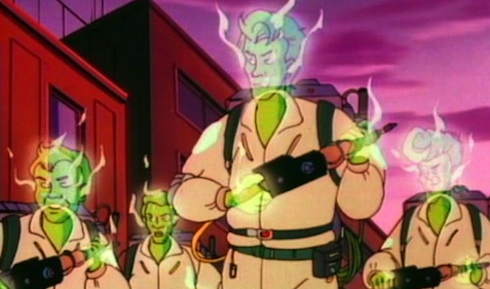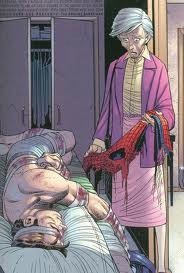Here at Tor.com, we haven’t been shy about our praise for the Kenneth Branagh helmed and Ashley Miller penned summer blockbuster Thor. (In short we thought it was smarter than expected and presented a wonderfully layered addition to the ongoing cinematic Marvel mythos.) During the viewing, staff writer Ryan Britt was confident that he saw a cameo from none other than Thor comics writer J. Michael Straczynski, and when the credits revealed his on-screen presence and story concept credit, his suspicion was confirmed. (JMS turns out to be the first person to stumble across Thor’s hammer. An interesting honor!)
This got us chatting about JMS’s unsung influence in the worlds of science fiction, fantasy, and comics. Here are four ways his influence has shaped our genre for the better.
4. He-Man & the Masters of the Universe
This may seem ridiculous, but JMS got his start by writing scripts about the Prince of Eternia and his secret power of Grayskull. Granted, JMS didn’t create the concept of He-Man, but the simple fact that someone who would later go on to write screenplays for Clint Eastwood movies (Changeling) and work with Kenneth Branagh (Thor) was infusing many of our childhoods with his ideas is striking. Further, the mixed universe of science fiction with magic seems to lend itself well to Straczynski’s sensibilities. Though He-Man was ultimately a kid’s show, it did challenge the viewer a lot in terms of what kind of world in which it took place, and what the various magical/science-fictional rules of that world entailed. Not surprisingly, the first script JMS sold to He-Man was titled “Origin of the Sorceress“, a character who blended science-fiction and magical elements simultaneously.
3. The Real Ghostbusters

Here’s another instance where JMS, a man who would win the Hugo a decade or so later found himself writing Saturday morning cartoons. Unlike He-Man however, JMS was the story editor for the first two seasons of the show, meaning he basically set the entire tone. In addition to creating the show’s production bible, JMS also penned 20 episodes himself. A stand-out of these is called “Citizen Ghost” (available on the special features of the Ghostbusters II DVD). This episode basically serves as a direct sequel to the original Ghostbusters film and attempts to reconcile the canon of said film with the TV show. In it we learn why the Ghostbusters stopped using the tan uniforms and switched to the colored ones for the TV show, and just how Slimer became friendly. Further, it features bizzaro versions of the Ghostbusters walking around in their old suits. Who think that sounds like a better idea for a second movie instead of the Vigo plot?
2. Amazing Spider-Man
In 2001, JMS took on Marvel Comics’ then-ailing Amazing Spider-Man title. It’s hard to imagine it now, but back then Spider-Man was a character that had suffered through nearly a decade of inconsistent characterization and convoluted storylines. He spent his days moping, for the most part, and when he wasn’t moping he was watching everyone die around him, sometimes repeatedly. The character was no fun.
JMS turned this around immediately, elevating the title and delivering genuinely funny, genuinely heartfelt storylines. Even if you thought he was making a misstep by retconning magic into what had been a purely scientific character, you still had to admit that it was fun to read the story as it played out.
But that’s not what impresses me about his run. No, that moment came at the end of issue #35, the close of JMS’s first arc on the book. Spider-Man stumbles home, costume torn to shreds, after finally defeating new nemesis Morlun. Without another thought, he throws himself into bed, still in costume and covered in bandages. He needs sleep now. Anything else can be taken care of in the morning.
 Then Aunt May walks in.
Then Aunt May walks in.
With any other writer, this would be a fake-out, but the subsequent issue in this storyline (#37) makes it very clear that Aunt May knows he is Spider-Man now. Peter knows that she knows, and the conversation that follows is nothing short of amazing.
In a series of scenes echoing the structure of a short play, Aunt May expresses anger, fear, disappointment, and more. She makes it clear how foolish Peter has always been to keep this from her, as if she was physically incapable of processing this information. As JMS has Aunt May lay this out, the reader finds themselves directly in Peter’s shoes. The clarity of the realization was astounding to me the first time I read it. How had it not occurred to me before? Aunt May and Peter are both adults, they’ve both dealt with much worse, of course Aunt May could deal with this.
With one issue I related to the characters and their struggles more fiercely than I ever had. And all it took was one conversation. All it took was JMS taking the relationship between Peter and Aunt May seriously, instead of in a supportive, saccharine manner. Something the Spider-Man comics, in their 40+ years, had never before achieved.
(As an aside, this was what really made me angry about the ”Brand New Day” reboot. Spider-marriage? Harry Osborn? Spider-magic? Whatever. Retcon it, I didn’t care. But don’t try and tell me issue #37 never happened. Because that is some serious bullshit.)
1. Babylon 5
Of the 110 episodes of Babylon 5, JMS wrote the teleplays for 92 of them, a record seemingly unbroken at this point. Notably, when Straczynski was shopping around his initial idea for Babylon 5 to TV networks he was pitching it as “five year novel for television.” Why would any person in their right mind take such a highbrow approach? Clearly JMS was pretty brave when it came to B5.
Even if Babylon 5 didn’t get the ratings it deserved it did establish one important trend: viewers like story arcs. Though arguably Deep Space Nine was exploring expanded story arcs around the same time; the totality of JMS having a vision for the overall story of Babylon 5 was groundbreaking. These days, when we think about television, arcs have become the standard, not just in SF, but also in all genres. (Especially in comics from the last ten years.) Viewers expect an ongoing story now. In terms of recent history of TV, JMS did it first with Babylon 5.
Ryan Britt is a staff writer for Tor.com and remembers very well how upset he was when Captain Sheridan died. This problem was compounded by the fact that one else he knew had any idea what Babylon 5 was.
Chris Lough is the production manager of Tor.com and was called in for Spider-Man but is going back to bed now.









